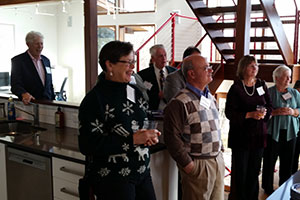 Addressing a gathering of retired- and almost-retired UConn faculty, School of Business Dean John A. Elliott urged them to use their expertise to help mentor junior staff and graduate students.
Addressing a gathering of retired- and almost-retired UConn faculty, School of Business Dean John A. Elliott urged them to use their expertise to help mentor junior staff and graduate students.
Dean Elliott thanked those congregated for their years of service to the School of Business, their willingness to act in an advisory capacity to him and to newer faculty, and recognized them as a vital connection to some of the School’s most illustrious alumni.
Rob Hoskin, Harry Johnson, Keith Johnson, Lin Klein, Jeffrey Kramer, Richard Norgaard, David Palmer, Murphy Sewall, James Sfiridis, Susan Spiggle and Crayton Walker were among those assembled, with their significant others, at the beautiful Mansfield home of Richard Norgaard and Karen Zimmer. Dean Elliott’s charming wife, Laura Philips, also attended the first formal gathering of retired faculty on Dec. 7.
Other important purposes of the meeting were to reinforce contacts among lifelong colleagues, share memories and enjoy each other’s company. Attendees enjoyed a catered, champagne brunch, entered a drawing for door prizes and shared stories of those who could not be present that day but wished to be remembered to all, such as Karla Fox who was in New York at the birth of her fourth grandchild.
One interesting discovery is the creative outlets in which some retirees are engaged. Michael Lubatkin has just published a scholarly book, but focused more in the area of philosophy than in management. Dick Kochanek has been painting for a number of years and his artwork has evolved such that he is currently receiving accolades at juried shows. Rob Hoskin has honed his skills as a craftsman and produces beautiful objects in wood.
Among those who could not attend is Steve Messner. His daughter would love to deliver any notes and well wishes, so please write to Steve in care of: Stephanie Brown, 144 Woodleaf Drive, Winter Springs, FL 32708.
Planning is underway to host a Spring 2015 event on the Storrs campus. More information will be provided soon. Those wishing to remain in touch should contact Cynthia H. Adams, Professor Emerita from the former School of Allied Health, at cindyadams930@gmail.com or 860-230-8951.
Photos from the gathering can be viewed here.